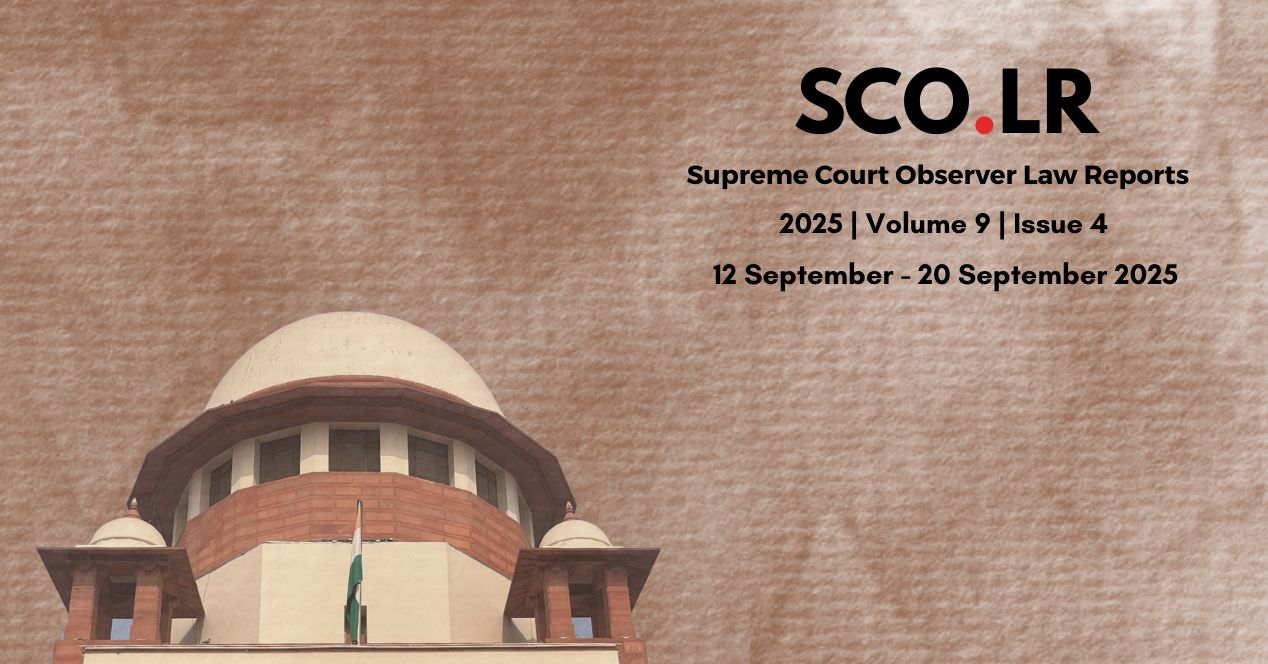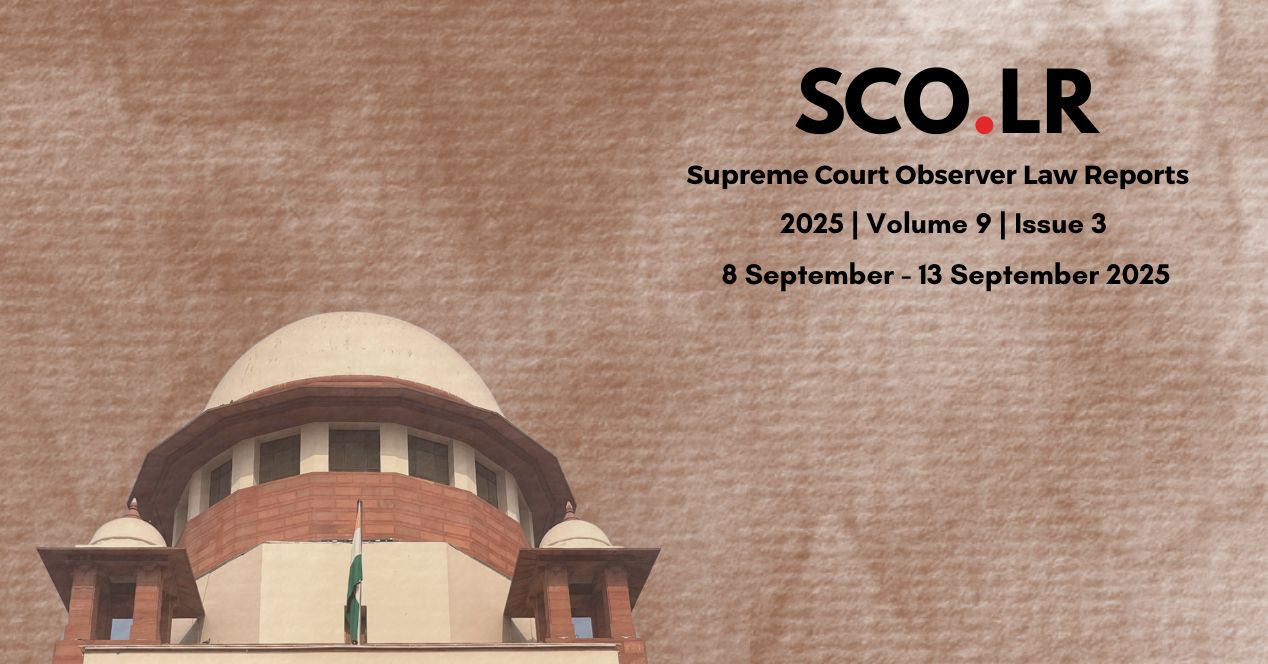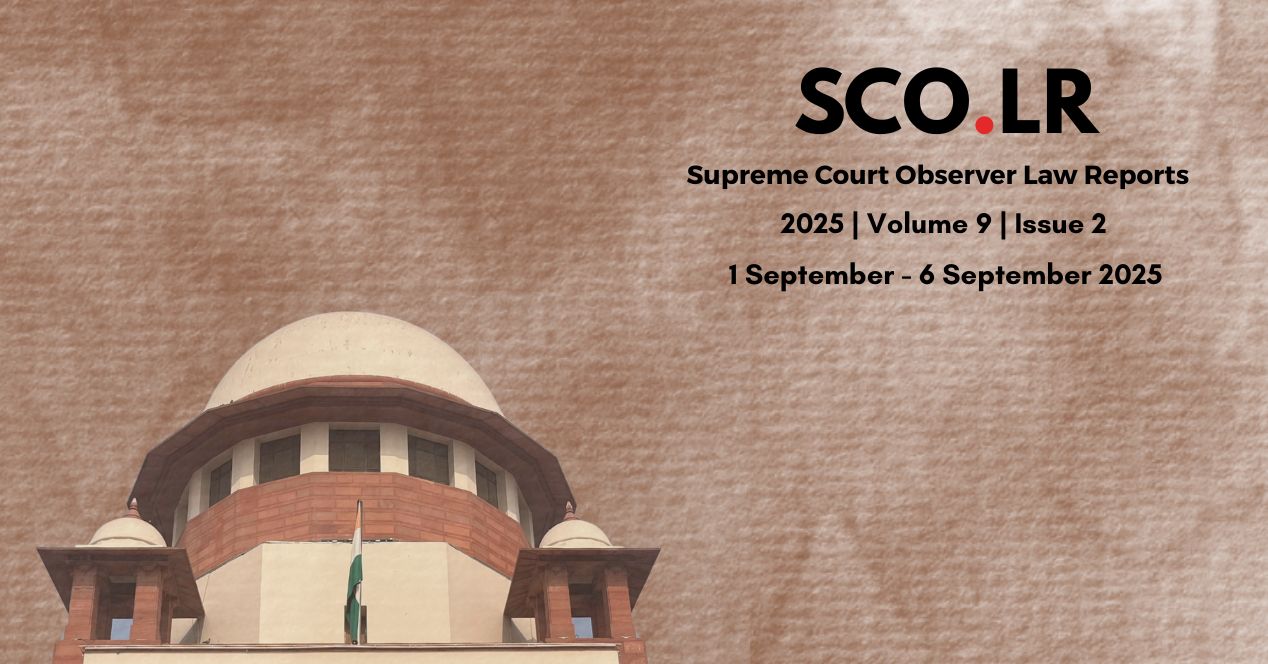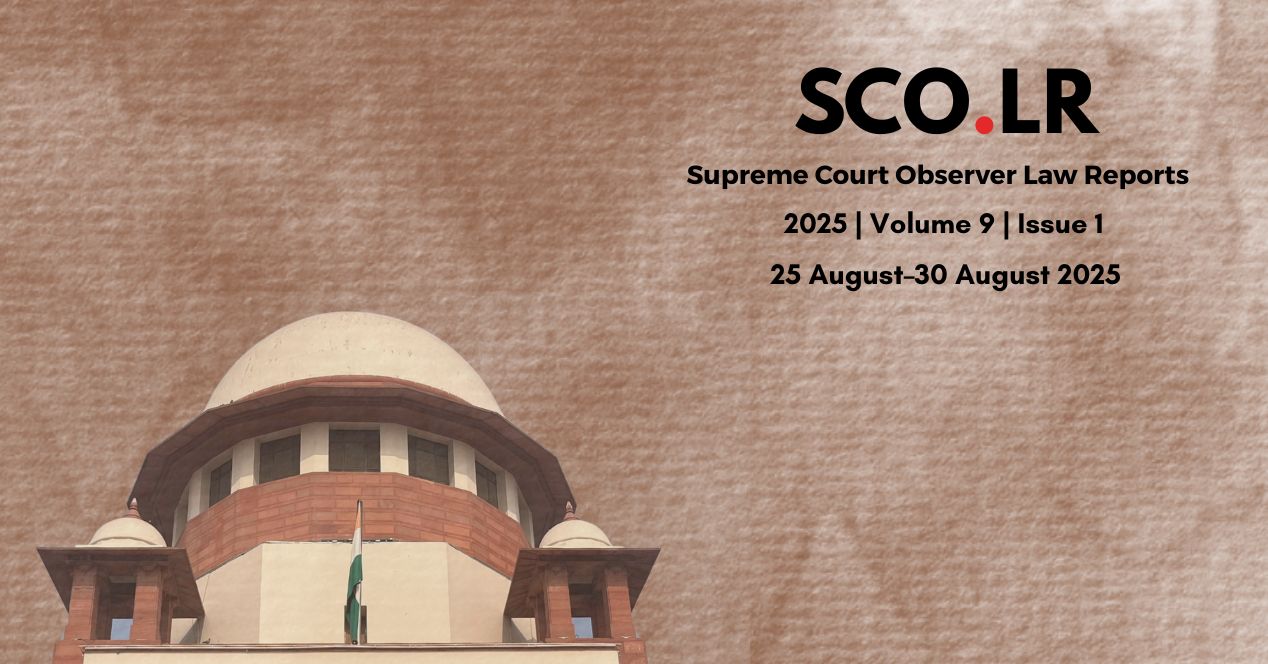Analysis
SCO.LR | 2025 | Volume 9 | Issue 5
In this Issue of SCO.LR, we bring you five important judgements from 22 September to 27 September 2025
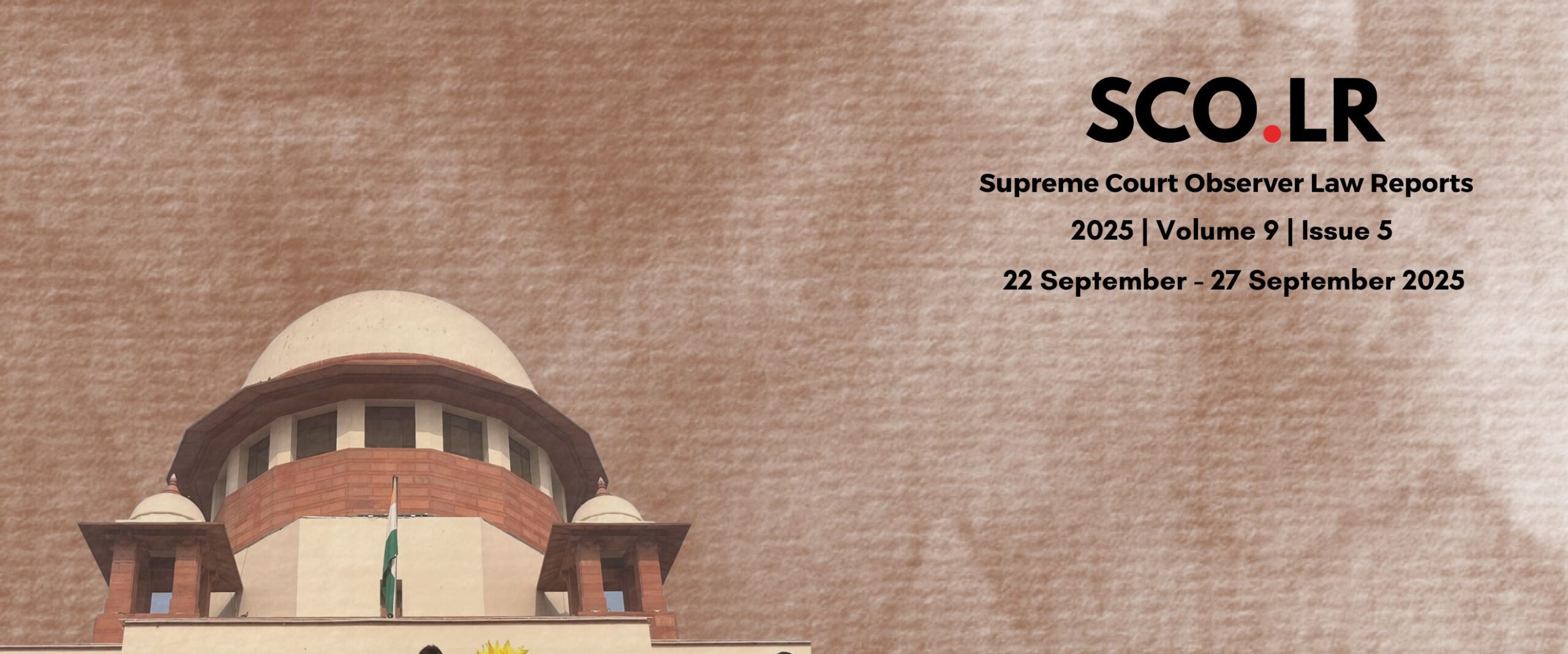
Volume 9 Issue 5 of SCO.LR is out!
Covering 22 to 27 September 2025, this issue highlights five key decisions: redemption rights under SARFAESI, limits on disciplinary action against advocates, unconstitutional tax exemptions for local manufacturers, statutory presumptions in cheque dishonour cases, and show-cause notices under the Competition Act.
SCO.LR makes Supreme Court judgments accessible in HTML format for a clean, easy reading experience. You can now link directly to paragraphs for your research and assignments!
Read the full issue on our SCO.LR page.
**********
The Supreme Court Observer Law Reports
SCO.LR | Volume 9 | Issue 5
22 September – 27 September 2025
**********
Borrower’s Right of Redemption Extinguished on Publication of Auction Notice under SARFAESI
M. Rajendran v KPK Oils and Proteins India Pvt. Ltd.
22 September 2025
Citations: 2025 INSC 1144 | 2025 SCO.LR 9(5)[1]
Bench: Justices J.B. Pardiwala and R. Mahadevan
The Supreme Court held that under the amended Section 13(8) of the SARFAESI Act, 2002, a borrower’s right to redeem the secured asset is lost upon publication of the auction sale notice and cannot survive until confirmation of sale.
The borrowers had availed loans against the mortgage of their property. When they failed to repay, the loan was classified as a Non-Performing Asset, leading the bank to begin recovery proceedings under the SARFAESI Act. An auction notice was published in January 2021. The appellants took part in the bidding process, paid the full purchase price and were issued a sale certificate in March 2021. Borrowers challenged the auction at the Debts Recovery Tribunal which dismissed their plea. The Madras High Court quashed the sale certificate and permitted redemption by repayment.
Allowing the appeals filed by the auction purchasers, the Supreme Court ruled that under the amended law, a borrower’s right of redemption comes to an end once the sale notice is published. Once the auction purchaser deposits the full consideration and a sale certificate is issued, the purchaser acquires a vested right that cannot be defeated by subsequent payments made by the borrower. It also underlined that High Courts should not step in through writ petitions when the Act already provides a specific remedy.
Key words/phrases: SARFAESI Act—Section 13(8)—borrower’s right of redemption—extinguished on publication of auction notice—High Court’s writ jurisdiction barred when alternative remedy exists—sanctity of public auctions—Madras High Court judgment set aside
Read the Judgement here.
**********
Jural Connection Essential for Disciplinary Action Against Advocates
Bar Council of Maharashtra and Goa v Rajiv Nareshchandra Narula
24 September 2025
Citations: 2025 INSC 1147 | 2025 SCO.LR 9(5)[2]
Bench: Justices Vikram Nath and Sandeep Mehta
The Supreme Court held that there should be a jural relationship between the advocate and the complainant in cases involving disciplinary proceedings. Courts cannot proceed on frivolous complaints of misconduct under Section 35 of the Advocates Act, 1961.
The complainant had alleged misconduct before the Bar Council of Maharashtra and Goa against advocates Rajiv Narula and Geeta Shastri. They argued that by identifying the deponent, the advocates had endorsed the contents of the affidavits making them liable for any falsehoods contained within them. The High Court quashed the disciplinary referrals, finding the complaints baseless. The Bar Council approached the Supreme Court.
The Supreme Court upheld the High Court’s decision. It clarified that Section 35 requires a “reason to believe” misconduct and a valid jural connection between the complainant and the advocate. Further, mere identification of parties or deponents does not constitute misconduct. The Court emphasised that safeguards exist to prevent harassment of advocates through malicious complaints.
Key words/phrases: Advocates Act, 1961—Section 35—prima facie misconduct—disciplinary proceedings—jural relationship required—frivolous/cryptic complaints—Bar Council of Maharashtra and Goa—High Court Order upheld—identifying parties/deponents not misconduct—protection against malicious complaints
Read the Judgement here.
**********
Discriminatory Exemption From Payment of Tax to Locally Manufactured Goods
M/s U.P. Asbestos Limited v State of Rajasthan
24 September 2025
Citations: 2025 INSC 1154 | 2025 SCO.LR 9(5)[3]
Bench: Justices B.V. Nagarathna and K.V. Viswanathan
The Supreme Court held that States can tax goods from other States only if they tax similar goods produced within their own State in the same way.
In 2007, a Rajasthan Government notification granted a blanket tax exemption to locally manufactured asbestos cement sheets made with fly ash while taxing similar goods that were imported from outside the State and then sold in Rajasthan. The appellant, an importer, challenged this notification on the grounds that it was discriminatory and violated Article 304(a) and Article 301 of the Constitution of India. The High Court found no discrimination between the imported and the local goods.
The Supreme Court quashed the notification for being discriminatory and violative of Article 304(a). The Court found no reason or justification for the distinction made by the Rajasthan government.
Key words/phrases: Section 8(3) Rajasthan VAT Act, 2003—Notification 9 March 2007 exempting local asbestos cement sheets/bricks with less than 25% fly ash—imported goods taxed—challenge of discrimination—Rajasthan High Court upheld—Supreme Court: exemption violated Article 304(a), impugned notification quashed—interim order—refund of differential VAT with 6% interest—appeals posted for directions
Read the judgement here.
**********
Statutory Presumptions under Negotiable Instruments Act
Sanjabij Tari v Kishore S. Borcar
25 September 2025
Citations: 2025 INSC 1158 | 2025 SCO.LR 9(5)[4]
Bench: Justices Manmohan and N.V. Anjaria
The Supreme Court held that once execution of a cheque is admitted, statutory presumptions made to assess a valid cheque under Sections 118 and 139 of the Negotiable Instruments Act, 1881 (NI Act) automatically arise. The burden lies on the accused to rebut them with cogent evidence.
Sanjabij Tari had advanced a friendly loan of ₹6,00,000 to the accused. The accused repaid the amount through a cheque which bounced. Tari initiated proceedings under Section 138 of the NI Act. The Trial Court and Sessions Court found that the cheque was issued in discharge of a legally enforceable debt and convicted the accused. The High Court, exercising revisional jurisdiction, acquitted the accused. It held that Tari’s limited salary showed incapacity to advance such a loan.
The Supreme Court restored the conviction. It observed that the complainant’s financial incapacity was insufficient grounds to quash his claim. The Court further clarified that violation of Section 269SS of the Income Tax Act, 1961, which prohibits acceptance of loans or deposits above ₹20,000 in cash, only invites a penalty under the Act and does not render the loan illegal, void or unenforceable under Section 138 of the NI Act.
Key words/phrases: Negotiable Instruments Act—Section 138—cheque dishonour—statutory presumptions—financial capacity—Section 269SS—Income Tax Act—loan enforceability—conviction restored—High Court interference improper—compounding guidelines modified
Read the Judgement here.
**********
Show-cause notice under the Competition Act, 2002
Kerala Film Exhibition Federation v Competition Commission of India
26 September 2025
Citations: 2025 INSC 1167 | 2025 SCO.LR 9(5)[5]
Bench: Justices Manoj Misra and K.V. Viswanathan
The Supreme Court held that the Competition Act, 2002 does not mandate a second show-cause notice to an accused person when determining penalties. A single notice at the start of the proceedings is sufficient for the accused persons to respond.
Film distributors accused the Kerala Film Exhibitors Federation (KFEF) and its office bearers for threatening to not screen their movies at member cinema halls if they supplied films to the Crown Theatre. Relying on a report by the Director General, the Competition Commission of India (CCI) held that KFEF was guilty of anti-competitive activities under Section 3(1) read with Section 3(3)(b). It imposed a penalty against the office bearers under Section 48. The Competition Appellate Tribunal (COMPAT) upheld the conviction but relieved the administrators. They held that the office bearers had not been issued a notice with a proposal of the penalty to be paid. The CCI appealed against the COMPAT’s Order at the Supreme Court.
The Supreme Court restored the CCI’s order and set aside the COMPAT’s judgement. It reasoned that the statute did not mandate a two-stage procedure or a second notice detailing the proposed punishment. The initial notice was sufficient, as it forwarded the DG Report and directed them to file replies, providing reasonable opportunity to reply.
Keywords/phrases: Section 48 Competition Act, 2002—Liability of office bearers—anti-competitive agreements under Section 3—only single show-cause notice sent—COMPAT held notice to office bearers not sent—Supreme Court sets aside COMPAT Order—Held single notice sufficient—CCI order restored
Read the Judgement here.

